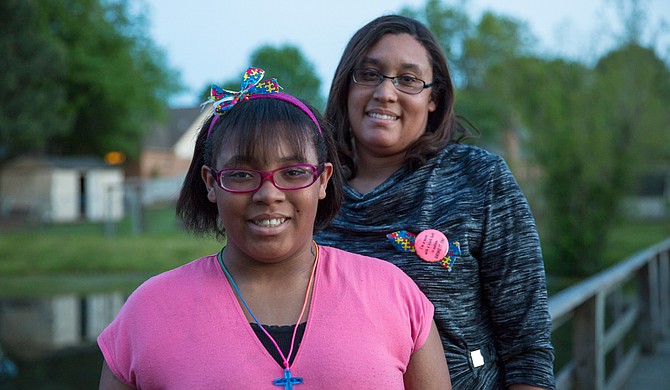Krystin Polk (front) has been sent to juvenile detention for behavior associated with her autism diagnosis. Her mother, Krystal (back), believes her daughter is not being disciplined correctly. Photo courtesy Polk Family
Krystal Polk's 13-year-old daughter, Krystin, has been arrested twice this school year. The first time, the eighth-grader spent the night in a juvenile detention center.
"He said he was arresting her for her own good," Polk said of the officer who she says picked up her daughter and drove her around for an hour before delivering her to the detention center. Because it was after office hours and she didn't know her rights, Polk said she was unable to get her daughter released from the center.
This happened after Krystin ran away from her school, Magnolia School, in Horn Lake, Miss. Polk said her daughter was experiencing what her individual educational plan calls a meltdown. Running, hitting and biting are all behavioral issues associated with Krystin's disability: autism.
She attends Magnolia School, a public institution designed to support students with social difficulties, to improve her behavior through therapy and conflict resolution.
Instead, Polk said, "They are punishing them or trying to correct (behavior) through punishment, and I don't think that is the correct way to do that."
Now, Krystin has not only missed weeks of school, but she has assault charges on her record.
"She only does that when she is touched in the middle of a meltdown," Polk said.
Pushing Kids Out
When the Center for Civil Rights Remedies at the University of California Los Angeles released its February 2015 report showing that Mississippi schools suspend more students than most other states, it validated trends familiar to many Mississippians.
The study, called "Are We Closing the School Discipline Gap?," ranked Mississippi No. 3 for its rate of elementary-school suspensions and No. 4 for its rate of secondary-school suspensions. It noted a decrease in suspension rates in many districts nationwide, but also found disparities in suspensions between white and black students as well as between disabled and non-disabled in the United States.
"Everybody in the advocacy field pretty much is aware that there are higher rates of suspension related to young males of color than to other populations in the public-school setting," said Oleta Fitzgerald, director of the Children's Defense Fund in Jackson.
Students with disabilities are suspended at a higher rate than any other population since, especially in Mississippi, they are not getting the services they need and are entitled to, Fitzgerald said.
Krystin's story illustrates the tendency for schools to use punishment to drive students, not just students with special needs but those educators deem disruptive, out of the classroom.
This trend, called "push out," also can apply to students who are simply not performing well, according to the American Civil Liberty Union's report on the school-to-prison pipeline.
"Schools may actually encourage dropouts in response to pressures from test-based accountability regimes such as the No Child Left Behind Act, which create incentives to push out low-performing students to boost overall test scores," the ACLU writes.
A National Bureau of Economic Research 2005 study, "Testing, Crime and Punishment," found that this trend can increase during testing times as teachers and administrators focus on keeping test averages high.
"While schools always tend to assign harsher punishments to low-performing students than to high-performing students throughout the year, this gap grows substantially during the testing window," the report states.
A Target on her Back
Fitzgerald attributes many of the suspension problems in American schools to zero-tolerance policies, which led to schools dishing out high penalties for minor offenses and could be used to justify "push-out." The policies are, in many ways, still used in Mississippi, even if more subtly.
The term "zero tolerance" was first attached to school policy beginning just before 1990 and mandated expulsion for drugs, fighting and gang-related activity.
It became national policy in 1994 when President Bill Clinton signed the Gun-Free Schools Act in response to several school shootings across the nation.
Since then, "zero tolerance" has been applied to situations including fighting, swearing, disrupting class, disobedience, truancy and other forms of misbehavior.
The U.S. Department of Justice filed a lawsuit in Jackson's U.S. District Court in 2012, claiming that students in Meridian have been shuffled into a school-to-prison pipeline due to "zero tolerance" punishment for minor offenses. The department found that students had been sent to juvenile detention for offenses as minor as dress-code violations.
In each case, the harsh policies disproportionately affected African American and disabled students—who, studies show, are often punished more stringently for the same offenses by white kids. For some students, being sent to juvenile detention made them susceptible to harsh punishment for smaller infractions in the future.
Polk said her daughter's record causes her to have a target on her back, and she says that educators and administrators punish Krystin more severely for minor offenses because of her history with police.
Because "zero tolerance" implies that everyone will be disciplined equally for the same misbehavior, students with special needs often are sent home for behaviors associated with their disability, zero-tolerance critics say.
"Are We Closing the Discipline Gap" urges schools to review their discipline policies to address these disparities and also advocates for greater teacher training. "[E]ducators have an opportunity for serious and successful reform in this area, and ... they are legally and morally obligated to take action. Whether at the federal, state, district or school level, the time to act is now," the report advises.
Greenville, Suspended
The 2015 UCLA report found that Greenville Public Schools in Greenville, Miss., had the second highest suspension rate of any district in the nation, with a rate of 59 percent in the 2011-2012 school year, an increase of 6.3 percent over the 2009-2010 school year.
It is important to note that in the UCLA study, and in most cases where suspensions are calculated into proportions, the rate refers to the number of suspensions divided by the student body. So if a school has a 20-percent suspension rate, that means it gives 20 suspensions per 100 students, including repeat offenders. This does not necessarily mean that 20 percent of its students have been suspended.
Fitzgerald said the Children's Defense Fund did not find numbers this high in Greenville during their analysis regarding zero tolerance policies in 2013.
"This is very troubling," she said.
But this could be because Greenville has changed its policies since 2011, as have many districts in the U.S., and that the UCLA report reflects older data that do not reflect the effects of revising the zero-tolerance approach.
Imagine a student in a busy hall at a Greenville high school. The student walking in front of him is carrying a backpack, which breaks and falls on top of him. In reaction, the student curses, a teacher overhears and sends him to the principal's office.
"That child would get a five-day suspension back in 2011," Greenville School District Superintendent Leeson Taylor said.
On the other side of the hallway wall, a student stands up from his desk and curses out his teacher, disrupting the entire class. He is also suspended for five days "because it's for the 'use of profanity'," Taylor said, suggesting that the two circumstances deserve different penalties.
"We had to put in some case-by-case analysis to get some of those things out of the way."
In the political fervor in the 1990s to institute harsher discipline, however, such discretion wasn't allowed. That was the initial point of "zero tolerance": all situations were treated the same, regardless.
The End of 'Zero Tolerance'?
Taylor arrived at Greenville School District in 2012. Since then, the school district has moved away from using zero-tolerance policies. In fact, it is applying a whole host of new policies, programs and training, Taylor said.
As a result, the school district's current data show a decrease in school suspension by roughly 40 percent. "We've actually reduced our suspension rate down to around 18 to 19 percent," Taylor said.
Taylor said he was surprised Greenville was ranked so high in the UCLA report and said it is not reflective of what's really going on in his district now.
His goal is to change the attitudes of the teachers and the relationships with their children. Taylor said if educators are encouraged to use conflict resolution as opposed to banishing students from their classrooms, more children will be in schools learning.
And that's the mindset Taylor he wants teachers to have. "If children are not at school, we can't do our jobs," Taylor said.
The policy changes include a model to analyze behavioral issues by each individual circumstance through a corrective, not punitive, disciplining system and limiting the number of days a child can be suspended.
Another Mississippi school district, Madison County, ranked fourth across the nation in the UCLA report for its suspension disparity between disabled and non-disabled students. In the 2011-2012 school year, the school suspended only 1.5 percent of its non-disabled students and 38.1 percent of its students with special needs.
Ellen Aregood, Madison County School District's administrative assistant to the superintendent, did not return calls to the Jackson Free Press. It's unclear if the school has taken measures since 2012 to help students with special needs correct their behavior without suspension.
Suspension Solutions
One thing is clear to many education professionals, and that is, "suspension doesn't solve the problem," Taylor said.
But the fact that suspension is still so rampant in Mississippi and U.S. schools suggests some attitudes of teachers and administrators towards pushing disruptive students out of the classroom haven't changed.
Taylor said Greenville reviewed its faculty and let educators go who were not willing to use conflict resolution and develop relationships with their students. Jackson School Board President Otha Burton said his district's disciplinary procedures changed when current Superintendent Cedrick Gray came in 2012. This also included making changes in personnel, Burton said.
"It's a question of training and options," said Jed Oppenheim, who has been involved with youth advocacy in several organizations including the Southern Poverty Law Center and the ACLU. "If it's easier to call a school resource officer or a school safety officer and that's what you're being told to do, then that's what you're going to do. But if you've been trained on positive interventions or conflict resolution, then hopefully that's what you'd be doing. And really we should only be using suspension and expulsion for the most extreme situations."
The National School Boards Association 2013 report, "Addressing the Out-Of-School Suspension Crisis: A Policy Guide for School Board Members," found that out-of-school suspension is little more than an ineffective disciplining strategy.
"The number of students missing instructional time highlights an urgent need to significantly decrease, if not eliminate, the use of out-of-school suspensions. The practice has been shown through research to adversely impact student learning and undermine students' growth in the classroom," the policy guide states. "Out-of-school suspensions as a disciplinary practice are indicative of gaps in policy strategies that must be remedied to ensure students have access to the necessary student-centered services to succeed."
Instead, the NSBA urges schools to use Positive Behavior Interventions and Supports, which look at the different reasons as to why students behave the way they do.
"This way of viewing school discipline is built on a more positive, collaborative and holistic framework for understanding how students connect with their school community," the report states.
The method is also designed to intervene before a situation escalates.









Comments
Use the comment form below to begin a discussion about this content.